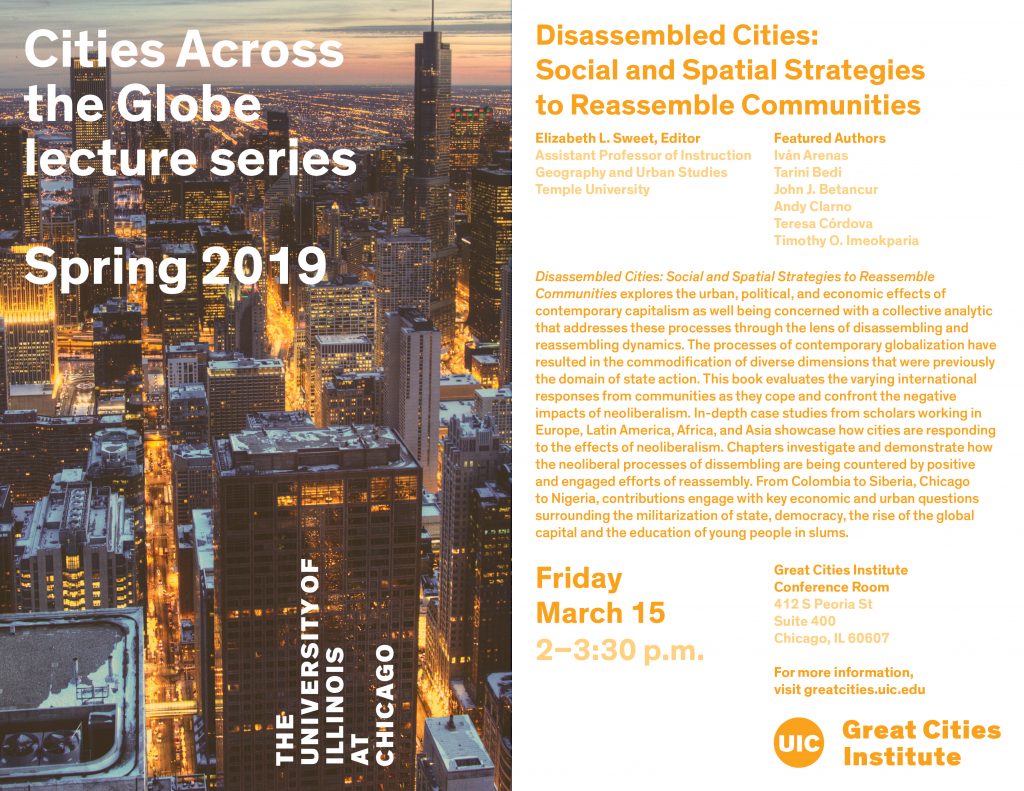The Chicago Region Environmental and Transportation Efficiency (CREATE), is the first of its kind consortium. The partnership between the U.S. DOT, State of Illinois, Cook County, City of Chicago, Metra, Amtrak, and the nation’s freight railroads are guiding the investment of billions of dollars into improving freight and passenger rail infrastructure. On March 21, Samuel Tuck III, the Bureau Chief of Freight Rail Management at the Illinois Department of Transportation, will lead a presentation, “Chicago Region Environmental and Transportation Efficiency: Keeping the Nation’s Economy Moving.” The presentation, part of the UTC Spring 2019 Seminar Series, will begin at noon and will be held in the Great Cities Institute Conference Room at CUPPA Hall. All are invited and pizza will be served. https://utc.uic.edu/
Disassembled Cities: Social and Spatial Strategies to Reassemble Communities
Join Great Cities Institute for a discussion with the editor, Elizabeth L. Sweet, and several chapter authors of the recently released book Disassembled Cities: Social and Spatial Strategies to Reassemble Communities. Authors in attendance will include Iván Arenas, Associate Director, UIC Institute for Research on Race and Public Policy; Tarini Bedi, Associate Professor, Anthropology; John J. Betancur, Professor, UIC Urban Planning and Policy; Andy Clarno, Associate Professor, Sociology & African American Studies; Teresa Córdova, Director and Professor, UIC Great Cities Institute; and Timothy O. Imeokparia, Associate Director of Research and Planning, UIC Great Cities Institute.
Disassembled Cities: Social and Spatial Strategies to Reassemble Communities explores the urban, political, and economic effects of contemporary capitalism as well being concerned with a collective analytic that addresses these processes through the lens of disassembling and reassembling dynamics. The processes of contemporary globalization have resulted in the commodification of diverse dimensions that were previously the domain of state action. This book evaluates the varying international responses from communities as they cope and confront the negative impacts of neoliberalism. In-depth case studies from scholars working in Europe, Latin America, Africa, and Asia showcase how cities are responding to the effects of neoliberalism. Chapters investigate and demonstrate how the neoliberal processes of dissembling are being countered by positive and engaged efforts of reassembly. From Colombia to Siberia, Chicago to Nigeria, contributions engage with key economic and urban questions surrounding the militarization of state, democracy, the rise of the global capital and the education of young people in slums.
As an expert in planning theory and qualitative research methodologies, Dr. Elizabeth L. Sweet teaches at Temple University in the Department of Geography and Urban Studies. Dr. Sweet engages in collaborative community economic development with a focus on the links between economies, violence, and identities. Using feminist and anti-racist frameworks, her work in Latino communities in the U.S. and in Latin America has led to long term collaborations and inclusive projects that both push the boundaries of planning theory and methods while at the same time provides practical intervention practices for planners.
If the above RSVP form is not working, please email gcities@uic.edu to RSVP.
Intervening with Aging Owners to Save Industrial Jobs: A Study Update
Authors
Timothy O. Imeokparia, Ph.D., AICP
Jackson C. Morsey, AICP
Abstract
This report presents the results of an update to a 1989 study titled “Intervening with aging owners to save industrial jobs” that assessed “the feasibility of retaining manufacturing jobs in Chicago by matching aging company owners who need successors with qualified minority and female entrepreneurs as buyers.” Similar to the previous report, the present study involves a national survey of literature and practice and an assessment of the successorship needs and plans of aging manufacturing entrepreneurs in Chicago. However, it extends the succession analysis of family-owned manufacturing small and medium enterprises (SMEs) to Cook County and its collar counties (Cook, DuPage, Kane, Lake, McHenry, and Will).
Why Are Millennials Leaving Chicago?
CBS 2 (WBBM-TV) interviewed Teresa Córdova, director of UIC’s Great Cities Institute and professor of urban planning and policy, in a segment on related to a Brookings Institution report on millennial migration figures for major U.S. cities. Córdova tells reporter Jim Williams that Chicago’s cost of living is a key factor behind the city’s declining millennial population.
“They’re leaving largely, I think, because it has to do with the cost of living,” said Dr. Teresa Cordova, of the University of Illinois at Chicago’s Great Cities Institute. “We need to find ways to make housing more affordable; not just building affordable housing units, but actually bringing down the cost of housing.
Full Story from CBS 2 (WBBM-TV) »
Gabrielle Lyon and Alex Linares join The Great Cities Team
Great Cities Institute is so pleased that Gabrielle Lyon is joining Great Cities to help us build our Cities, Youth and Design Initiative. Alex Linares joins us from the worker cooperative development sector to help build our research on entrepreneurship and workforce development. We are excited to have them as a part of our team. Read their bios below for a preview of what they’ll be working on.
Gabrielle Lyon, Ph.D., is a nationally-recognized non-profit leader, educator, and public speaker with a background that includes launching and leading award-winning social impact organizations and initiatives focused on leveling the playing field of educational opportunity for underserved youth particularly in science, architecture and urban planning. As a senior researcher at the Great Cities Institute she is exploring issues related to cities, youth and design. Questions of interest include: How are youth currently involved in shaping the places they live and learn? What impact do participatory urban experiences have on civic identity? What can be done to generate an evidence base that ensures youth voice informs the development of urban plans at all scales?
Lyon is the author of No Small Plans, a graphic novel that follows the neighborhood adventures of teens in Chicago’s past, present and future designed to ignite urban planning and civic engagement and coeditor of A Simple Justice: The Challenge of Small Schools. Lyon received her BA and MA in History from the University of Chicago and her PhD in Curriculum Studies from the University of Illinois at Chicago. Amongst her honors include being named a National After School Champion by the After School Alliance, Chicagoan of the Year by Chicago Magazine and a Leadership Fellow with the Chicago Community Trust. You can follow her at @LyonGabrielle or visit Lyon-Strategies.com.
Alex Linares is an Economic Development Planner and will be working on research projects and engagement with community-based organizations. He works primarily within GCI’s research clusters of employment and economic development, and community wellbeing. Linares most recently published report Policy Recommendations for Amendments to the State of Illinois Worker Cooperative Statute was presented at Chicago’s 1st Cooperative Economy Summit.
Linares comes with vast experience in the nonprofit sector working on issues in labor rights, worker cooperatives, interim housing, and workforce development. Previously he worked for the Working World, a non-profit lending organization, where he was assigned to provide technical assistance to New Era Windows Cooperative, the largest manufacturing worker cooperative in Chicago. At New Era Windows, he provided technical assistance in operations management and sales. Linares also worked as an organizer and paralegal for the Working Hands Legal Clinic, which assisted immigrant workers with wage theft cases, and violations of the Illinois Day and Temporary Labor Services Act. He conducted various know your rights labor workshops throughout Chicagoland including Waukegan, Joliet, Melrose Park, and the Mexican Consulate.
Amazon’s Hard Bargain Extends Far Beyond New York

An Amazon fulfillment center in San Marcos, Tex., visible through the window of a nearby hotel. Credit: Tamir Kalifa for The New York Times
The New York Times quotes Beth Gutelius, a senior research specialist at UIC’s Great Cities Institute, in a story on Amazon’s expansion and the company’s mixed success with building community relationships.
As Amazon expands, including closer to more major cities like New York and Chicago, it is facing more local demands.
“People think that Amazon is a 100 percent sleek machine,” said Beth Gutelius, a researcher at the University of Illinois at Chicago with a focus on warehouses. In reality, a lot falls through the cracks. “Even if they are trying to be strategic locally, they can’t actually do it because they are so big and sprawling.”
Thousands Of African-Americans Are Leaving Chicago Each Year. Why?

A view of the Auburn-Gresham neighborhood on Chicago’s South Side. The city’s black population is on track to shrink to 665,000 by 2030 — down from a peak of about 1.2 million, according to the Urban Institute. (Danielle Scruggs for Here & Now)
Teresa Córdova, director of the UIC Great Cities Institute and professor of urban planning and policy, is interviewed by National Public Radio & WBUR-FM’s “Here and Now” in a story on Chicago’s declining African-American population.
Chicago has seen a decrease in its overall population since 1950, but the trend has been driven lately by African-Americans, who have seen their population decline by 33 percent in that time, according to Teresa Córdova, director of the Great Cities Institute at the University of Illinois Chicago.
“In a lot of these neighborhoods where we’re seeing the largest decline, those are also neighborhoods where you have a lot of job loss, particularly since 1975,” Córdova says. “Along with that job loss you saw disinvested neighborhoods with declines in anchor institutions — the corner grocery stores, even schools. So overall in these conditions of disinvestment, people are weighing their options.”
The segment’s audio and a related online story are available here.
Till We Have Built Jerusalem: Architects of a New City
Video from the February 20, 2019 event with author Adina Hoffman and co-sponsored by UIC Great Cities Institute, UIC Jewish Studies Program, the Masters in City Design Program and the Department of Urban Planning and Policy.
Planning for Great Cities, Great Rivers on the Southeast Side
Great Cities Institute has released the Calumet River Communities Planning Framework. Through a year-long process, GCI worked to develop a framework for future development in the community areas of South Chicago, South Deering, and East Side on the city’s Southeast Side.
Historically the Calumet River has served as the primary location for industries relocating as the Chicago River changed its usage and industry mix. Industries like steel in the late 19th century and today businesses like metal recyclers have relocated to the Calumet River.
The framework is intended to act as an information source for organizations or businesses looking to do work or development projects on the Southeast Side. The document establishes principles for development that are grounded in community feedback as identified throughout the planning process.
Focusing on issues identified by the Southeast Side communities. The document is designed to supply residents and local organizations with data that can be used to organize campaigns to promote the quality of health in the community.
To address these key issue areas, the report features the following considerations and recommendations for future planning in the Calumet River region:
Public Health and the Environment
- Prioritize remediation of contaminated industrial sites
- Strengthen regulations that require industrial contaminators to reduce pollution and remediate contamination at their own expense
- Create a Department of Environment at the city level to enforce remediation regulations, identify offenders and escalate the consequences of remediation noncompliance as needed
- Collaborate with the Chicago Department of Public Health to ensure that contamination is properly identified and that its health impacts are mitigated
- Increase access to public health resources within the community
- Advocate for more environmental and health programming at schools and throughout the community
- Build the organizational capacity for environmentally focused organizations
Social Equity
- Ensure that jobs created by remediation efforts and that the reuse of industrial sites are first offered to local businesses and residents of surrounding communities
- Increase housing availability for residents of all ages and income levels
- Improve public transit accessibility
- Increase community access to fresh fruits and vegetables
- Enhance bicycle and pedestrian paths
- Improve the park system
Economic Development
- Apply green technologies for remediation and economic development
- Establish and attract environmentally conscious businesses to the Calumet Industrial Corridor
- Continue to develop Commercial Avenue as the “Downtown of the Southeast Side”
- Expand commercial planning to other major corridors
- Continue to develop and capture new markets and visitors to the region
In August 2016, the Metropolitan Planning Council (MPC) released the Our Great Rivers vision for the Chicago, Calumet, and Des Plaines rivers. The MPC document presented a vision to make Chicago’s rivers more inviting, productive, and living for the residents of the city. As a part of the Our Great Rivers project, the Chicago Community Trust announced in February 2017 funding for neighborhood projects that support the implementation of the Our Great Rivers vision.
Recognizing the importance of the Calumet River and the Region, GCI saw the opportunity with the Our Great Rivers funding to bring together local community organizations to develop a strategy to address environmental and economic issues in the Calumet River communities. We appreciate the grant from the Chicago Community Trust that partially funded this document.
The full Calumet River Communities Planning Framework document can be accessed through the GCI website here.
Youth Job Center presents: Multiple Choice Panel Discussion





